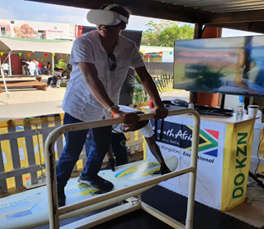Digitalisation is transforming many industries across the globe. According to Euromonitor International, 2022’s online expenditure on goods and services globally soared to an impressive USD10.2 trillion, marking a significant digital shift.
Online sales for travel reaching an impressive USD1.9 trillion in the same year, constituting over 10% of total online sales
Source: Euromonitor International
Travel also experienced this surge, underpinned by companies such as Expedia, Airbnb, and Uber, which have assisted in making travel booking seamless. As technology develops further, disruptive technologies are emerging, from Artificial Intelligence (AI) to cloud computing, adding to the traveller experience. The Middle East and Africa (MEA) is seen as a development frontier, offering a significant opportunity due to the rapid impact of smartphone penetration and mobile internet access on consumer behaviour. For travel operators, this creates an opportunity to meet the demands of a dynamic market that craves unique, immersive experiences, particularly among the region's substantial youth demographic.
Accelerated growth of digitalisation
The pandemic acted as a catalyst, compressing five years' worth of digital progress into a single year, as physical contact became limited and establishing an online presence became paramount. The balance between offline and online sales in the global travel sector is shifting, with online now accounting for just over 50% of total travel sales. However, in MEA, it stands lower at 30%, emphasising the region's need to address challenges such as limited infrastructure, lower internet penetration, and other factors contributing to the digital divide.
However, it is important to recognise that this digital gap also presents distinctive opportunities for growth and innovation. According to Euromonitor International’s Digital Consumer Survey, the growth of digitalisation in the region is closely linked to the expansion of the online community.
In 2023, over 40% of the MEA population, totalling over 750 million users, are now connected to the internet - double the rate from a decade ago
Source: Euromonitor International
Smartphone ownership is the primary catalyst, driving rapid internet adoption and facilitating digital service access. Government support and regulatory developments further propel digitalisation as a crucial pillar for economic growth in the region.
Millennials and Generation Z are creating a domino effect for digitalisation adoption
Generational dynamics play a pivotal role in driving change and opportunities, particularly as the region has a large youth population. Over 48% of the total population in the region is under the age of 20 years old. While travellers of all generations commonly utilise online tools such as search engines, mapping apps, and travel provider websites, it is millennials and Generation Z who are at the forefront of digitalisation adoption. These young generations demand tech-savvy accommodation and personalised experiences, shaping a digital-centric lifestyle. As architects of this trend, they drive the region towards mobile-first strategies, blending the digital and physical worlds for immersive and tailored travel experiences.
Adopting innovative technology
Throughout the Middle East and Africa, travel operators are adopting digitalisation by using innovative technology to meet travellers’ evolving demands. These technological innovations are not just tools; they are redefining how travellers plan, book, and experience their journeys, thereby disrupting traditional business models. Success in this digital era hinges on adaptation, innovation, and delivering the seamless experiences sought by travellers in search of more than just a holiday.
According to Euromonitor International’s Voice of the Industry 2023 Survey, key technologies set to impact the industry over the forecast period encompass Artificial Intelligence (AI), the internet of things, generative AI and robotics. AI is expected to drive search capabilities and consumer engagement. Integrating such technologies into business models across tourism is crucial to remain relevant, as these tools offer future-proof, consumer-centric, and experiential solutions.
Innovative digital pioneers across the region
Each country, with its unique set of challenges and opportunities, has embarked on a journey to transform the travel landscape with user-centric solutions.
Saudi Arabia has introduced instant e-visas for various countries, targeting 100 million annual visitors by 2030. In the United Arab Emirates, the use of facial recognition technology through the Biometric Passenger Journey and Smart Gates at Dubai International Airport is revolutionising travellers’ journeys. Emirates Airlines complements this with automation through multilingual check-in robots. Meanwhile, the Visit Qatar mobile app, launched by the Qatar National Tourism Council, caters for modern travellers, offering immersive site 360-degree views of iconic sites and aiding trip planning.
In Africa, Egypt's ECO EGYPT Virtual Reality (VR) tourism campaign, a collaboration between the Ministry of Environment and UNDP, uses virtual reality to promote ecotourism with immersive VR tours of protected areas.

Photo Source: VR Dublin
In Kenya, platforms such as Viutravel, Jumia Travel, Booking.com, and Airbnb have streamlined bookings and introduced mobile payment options like M-Pesa, reducing the reliance on cash transactions. The Kenyan Tourism Board's #MagicAwaits campaign, featuring virtual live streams, plays a pivotal role in promoting the country's destinations and engaging travellers.
How should travel companies respond?
Looking ahead, the forecast indicates a promising trajectory.
Online travel booking sales in the Middle East and Africa are expected to record a 7% CAGR from 2023 to 2028
Source: Euromonitor International
Like other industries, technology and travel is expected to become increasingly intertwined, creating a world where boundaries no longer limit exploration. As travellers’ expectations evolve in a dynamic digital landscape, operators must innovate and adapt to remain relevant. Integrating technology into business models, combined with understanding evolving traveller demands, is key to unlocking the industry's digital potential. The region's freedom from legacy systems fosters tailored digitalisation, unlocking opportunities in a fast-growing digital ecosystem. This aligns with travellers’ evolving preferences, driving tourism growth through innovative strategies.
For more discussion on modern travellers, read our article Identifying the Traveller of the Future Through Consumer Segmentation
